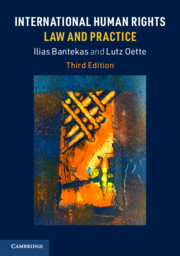Refine search
Actions for selected content:
18 results
The challenge of phasing out fossil fuels for highly fossil fuel-dependent countries in international law
-
- Journal:
- Leiden Journal of International Law , First View
- Published online by Cambridge University Press:
- 05 September 2025, pp. 1-20
-
- Article
-
- You have access
- Open access
- HTML
- Export citation
1 - Sustainability’s Journey
-
- Book:
- International Financial Institutions and Sustainable Development
- Published online:
- 09 June 2025
- Print publication:
- 26 June 2025, pp 36-57
-
- Chapter
- Export citation
7 - Facilitation of Foreign Direct Investment through International Economic Law
- from Part II - Political Economy Perspectives of Investment Facilitation Rule-Making
-
-
- Book:
- The Making of an International Investment Facilitation Framework
- Published online:
- 13 March 2025
- Print publication:
- 20 March 2025, pp 175-209
-
- Chapter
-
- You have access
- Open access
- HTML
- Export citation
‘Local Communities’ and the Development Conundrum: Where International Investment Law Meets Human Rights and Businesses
-
- Journal:
- Business and Human Rights Journal / Volume 9 / Issue 2 / June 2024
- Published online by Cambridge University Press:
- 10 December 2024, pp. 270-293
-
- Article
-
- You have access
- Open access
- HTML
- Export citation
Introduction
-
- Book:
- International Human Rights Law and Practice
- Published online:
- 08 February 2024
- Print publication:
- 15 February 2024, pp 1-3
-
- Chapter
- Export citation
14 - The Right to Development and Sustainable Development
-
- Book:
- International Human Rights Law and Practice
- Published online:
- 08 February 2024
- Print publication:
- 15 February 2024, pp 641-690
-
- Chapter
- Export citation

International Human Rights Law and Practice
-
- Published online:
- 08 February 2024
- Print publication:
- 15 February 2024
-
- Textbook
- Export citation
19 - China and the Non-weaponization of Outer Space
- from Part VI - The Habitat and the Global Commons
-
-
- Book:
- The Cambridge Handbook of China and International Law
- Published online:
- 04 January 2024
- Print publication:
- 18 January 2024, pp 379-394
-
- Chapter
- Export citation
5 - Righting Markets
-
- Book:
- Completing Humanity
- Published online:
- 16 January 2024
- Print publication:
- 21 December 2023, pp 199-239
-
- Chapter
- Export citation
15 - The Road from 1966
- from Part III - Social Rights in the Age of Internationalism
-
-
- Book:
- Social Rights and the Politics of Obligation in History
- Published online:
- 11 January 2022
- Print publication:
- 06 January 2022, pp 287-307
-
- Chapter
- Export citation
5 - The Role of Business in International Development and the Attainment of the Sustainable Development Goals
-
-
- Book:
- The Cambridge Companion to Business and Human Rights Law
- Published online:
- 10 September 2021
- Print publication:
- 09 September 2021, pp 86-114
-
- Chapter
- Export citation
5 - The Substance of Altruism in International Law: Development for the Other
-
- Book:
- Altruism in International Law
- Published online:
- 06 August 2021
- Print publication:
- 12 August 2021, pp 150-181
-
- Chapter
- Export citation
5 - The Postcolonial ‘Developmental’ State
- from Part II - International Law and the Postcolonial State
-
- Book:
- Minorities and the Making of Postcolonial States in International Law
- Published online:
- 21 May 2021
- Print publication:
- 10 June 2021, pp 200-276
-
- Chapter
- Export citation
Right to Development Governance in the Advent of the African Continental Free Trade Area
-
- Journal:
- Journal of African Law / Volume 65 / Issue 2 / June 2021
- Published online by Cambridge University Press:
- 21 July 2021, pp. 153-178
- Print publication:
- June 2021
-
- Article
- Export citation

International Human Rights Law and Practice
-
- Published online:
- 30 November 2020
- Print publication:
- 23 April 2020
-
- Book
- Export citation
14 - The Right to Development and Sustainable Development
-
- Book:
- International Human Rights Law and Practice
- Published online:
- 30 November 2020
- Print publication:
- 23 April 2020, pp 619-667
-
- Chapter
- Export citation
Treaty Norms and Climate Change Mitigation
-
- Journal:
- Ethics & International Affairs / Volume 23 / Issue 3 / Fall 2009
- Published online by Cambridge University Press:
- 25 March 2011, pp. 247-266
-
- Article
- Export citation
NATURAL RESOURCE REVENUE SHARING SCHEMES (TRUST FUNDS) IN INTERNATIONAL LAW
-
- Journal:
- Netherlands International Law Review / Volume 52 / Issue 1 / May 2005
- Published online by Cambridge University Press:
- 28 April 2005, pp. 31-56
- Print publication:
- May 2005
-
- Article
- Export citation
